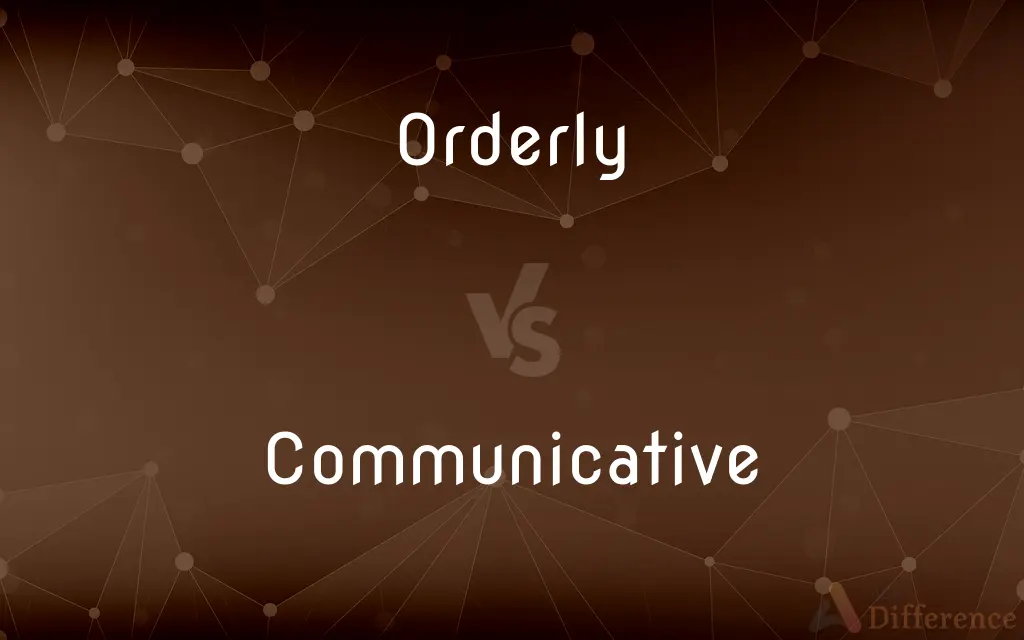Orderly vs. Communicative — What's the Difference?
By Urooj Arif & Fiza Rafique — Updated on March 18, 2024
Orderly focuses on organization and discipline, whereas communicative emphasizes the exchange of information.

Difference Between Orderly and Communicative
Table of Contents
ADVERTISEMENT
Key Differences
Orderly pertains to a state of organization and discipline, ensuring that everything is arranged neatly and functions smoothly. This quality is essential in environments where structure and precision are paramount, such as in military or healthcare settings. On the other hand, communicative relates to the ability or process of sharing information, ideas, or feelings. This trait is crucial for effective interpersonal relationships and is valued in settings that require teamwork, negotiation, or teaching.
While orderly environments or individuals prioritize rules, protocols, and cleanliness, communicative ones focus on openness, dialogue, and the exchange of thoughts. An orderly person might excel in maintaining systems and adhering to schedules, whereas a communicative person thrives in social interactions and expressing ideas clearly.
Orderliness can sometimes lead to rigidity, where the emphasis on structure and protocol overrides flexibility. In contrast, highly communicative environments or individuals might face challenges with over-information or lack of focus, as the free flow of communication can sometimes detract from structured task execution.
In terms of skill development, becoming more orderly involves cultivating habits of organization, punctuality, and attention to detail. Improving communicative skills, however, requires practice in listening, verbal and non-verbal expression, and empathy to enhance mutual understanding.
The value of orderliness is often measured by the efficiency and reliability it brings to operations and personal habits. Conversely, the effectiveness of communication is gauged by the depth of understanding, the strength of relationships, and the clarity of shared information.
ADVERTISEMENT
Comparison Chart
Focus
Organization and discipline
Exchange of information
Key Settings
Military, healthcare
Teamwork, negotiation, teaching
Strengths
Maintains systems, adherence to schedules
Thrives in social interactions, clear idea expression
Potential Downsides
Can lead to rigidity
Possible over-information or lack of focus
Skill Development
Cultivating habits of organization
Practicing listening and expression
Compare with Definitions
Orderly
Denoting calm and controlled behavior.
Despite the chaos, she remained orderly and focused.
Communicative
Open and expressive in verbal and non-verbal communication.
Her communicative gestures made the presentation engaging.
Orderly
Pertaining to neatness and organization.
The library books were arranged in an orderly manner.
Communicative
Involving communication between people.
The project required a highly communicative approach to ensure everyone was aligned.
Orderly
Characterized by adherence to rules.
The orderly classroom facilitated a better learning environment.
Communicative
Emphasizing the importance of interaction.
The workshop's communicative activities boosted participant engagement.
Orderly
Following a systematic and disciplined approach.
The soldier maintained an orderly routine.
Communicative
Inclined to share or exchange information, ideas, or feelings.
He was highly communicative, making him an effective team leader.
Orderly
Involving a sequence or arrangement.
The documents were filed in an orderly fashion.
Communicative
Effective in conveying messages or information.
The teacher's communicative skills helped simplify complex topics.
Orderly
In healthcare, an orderly (also known as a ward assistant, nurse assistant or healthcare assistant) is a hospital attendant whose job consists of assisting medical and nursing staff with various nursing and medical interventions. The highest role of an orderly is that of an operations assistant.
Communicative
Inclined to communicate readily; talkative.
Orderly
Free from disorder; neat or well-arranged
An orderly room.
Communicative
Of or relating to communication.
Orderly
Having a systematic arrangement
A garden with orderly rows.
Communicative
Eager to communicate; talkative.
Orderly
Given to keeping things neat or well-arranged
An orderly housekeeper.
Communicative
Inclined to communicate; ready to impart to others.
Determine, for the future, to be less communicative.
Orderly
Adhering or conforming to a method or system
An orderly researcher.
Communicative
Of or relating to communication;
Communicative arts
Orderly
Devoid of violence or disruption; peaceful
An orderly transition of governments.
Communicative
Able or tending to communicate;
Was a communicative person and quickly told all she knew
Orderly
An attendant who does routine, nonmedical work in a hospital.
Orderly
A soldier assigned to attend and perform various tasks for a superior officer.
Orderly
Systematically; regularly.
Orderly
Neat and tidy; possessing order.
He has always kept an orderly kitchen, with nothing out of place.
Orderly
Methodical or systematic.
We live in an orderly universe, where rules govern both the movements of planets and the binding of molecules.
Orderly
Peaceful; well-behaved.
An orderly gathering of citizens stood on the corner awaiting the bus.
Orderly
Being on duty; keeping order; conveying orders.
Orderly
A hospital attendant given a variety of non-medical duties.
Orderly
(military) A soldier who carries out minor tasks for a superior officer.
Orderly
According to good order or practice; appropriately, in a well-behaved or pos=adjective way.
Orderly
(obsolete) In order; in a particular order or succession; with a suitable arrangement.
Orderly
Conformed to order; in order; regular; as, an orderly course or plan.
Orderly
Observant of order, authority, or rule; hence, obedient; quiet; peaceable; not unruly; as, orderly children; an orderly community.
Orderly
Performed in good or established order; well-regulated.
Orderly
Being on duty; keeping order; conveying orders.
Orderly
According to due order; regularly; methodically; duly.
You are blunt; go to it orderly.
Orderly
A noncommissioned officer or soldier who attends a superior officer to carry his orders, or to render other service.
Orderlies were appointed to watch the palace.
Orderly
A street sweeper.
Orderly
A soldier who serves as an attendant to a superior officer;
The orderly laid out the general's uniform
Orderly
A male hospital attendant who has general non-medical duties
Orderly
Devoid of violence or disruption;
An orderly crowd confronted the president
Orderly
According to custom or rule or natural law
Orderly
Not haphazard;
A series of orderly actions at regular hours
Orderly
Marked by or adhering to method or system;
A clean orderly man
An orderly mind
An orderly desk
Orderly
Marked by system or regularity or discipline;
A quiet ordered house
An orderly universe
A well regulated life
Orderly
Marked by an orderly, logical, and aesthetically consistent relation of parts;
A logical argument
The orderly presentation
Common Curiosities
Why is orderliness important in the workplace?
Orderliness contributes to efficiency, productivity, and a safe working environment.
What are the downsides of excessive communication?
Excessive communication can lead to information overload, distraction, and reduced productivity.
How can one improve their orderliness?
Improving orderliness involves practicing regular cleaning, organizing, and planning routines.
What defines an orderly person?
An orderly person is someone who values neatness, organization, and discipline in their actions and surroundings.
How can communicative skills benefit an individual?
Communicative skills enhance an individual's ability to share ideas, understand others, and build strong relationships.
What are the challenges of being too orderly?
Being overly orderly can lead to inflexibility and a reluctance to adapt to changes or new ideas.
Why is adaptability important in communication?
Adaptability allows individuals to adjust their communication style based on context, audience, and objectives, improving effectiveness.
Can someone be both orderly and communicative?
Yes, individuals can cultivate both qualities, balancing organization with effective communication.
How does communication affect teamwork?
Effective communication is crucial for teamwork as it ensures clear understanding, alignment of goals, and resolves conflicts.
Can orderliness affect mental health?
Yes, both positively by reducing stress through organization, and negatively if it becomes obsessive or restrictive.
What steps can be taken to enhance communicative abilities?
Enhancing communicative abilities can be achieved through active listening, practice in diverse communication forms, and feedback.
How does technology impact communicative practices?
Technology broadens communicative practices through digital platforms, enhancing reach but also posing challenges in digital etiquette.
How does orderliness contribute to personal success?
Orderliness can contribute to personal success by fostering discipline, efficiency, and reliability in one's personal and professional life.
Is being orderly valued in all cultures?
While orderliness is valued in many cultures, the emphasis on it can vary based on societal norms and values.
What role does empathy play in communication?
Empathy is crucial in communication as it enables understanding from another's perspective, fostering deeper connections and mutual respect.
Share Your Discovery

Previous Comparison
Nebula vs. Supernova
Next Comparison
Mostaccioli vs. RigatoniAuthor Spotlight
Written by
Urooj ArifUrooj is a skilled content writer at Ask Difference, known for her exceptional ability to simplify complex topics into engaging and informative content. With a passion for research and a flair for clear, concise writing, she consistently delivers articles that resonate with our diverse audience.
Co-written by
Fiza RafiqueFiza Rafique is a skilled content writer at AskDifference.com, where she meticulously refines and enhances written pieces. Drawing from her vast editorial expertise, Fiza ensures clarity, accuracy, and precision in every article. Passionate about language, she continually seeks to elevate the quality of content for readers worldwide.
















































